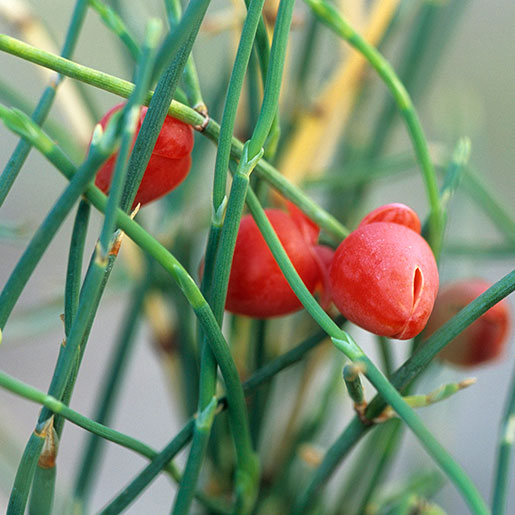Ephedra

Common Names: ephedra, Chinese ephedra, ma huang
Latin Names: Ephedra sinica
Background
- Ephedra is a low evergreen shrub with small, scaly leaves. The herb usually comes from the stem and branches of the Ephedra sinica species.
- Ephedra has a long history of medicinal use in China and India to treat colds, fever, headaches, congestion, coughing, wheezing, and other conditions.
- The U.S. Food and Drug Administration (FDA) banned the sale of dietary supplements containing ephedrine alkaloids (stimulant compounds found in Ephedra sinica and some other plants) in the United States in 2004. Prior to the ban, ephedra was an ingredient in some dietary supplements promoted for weight loss, increased energy, and enhanced athletic performance.
How Much Do We Know?
- Almost no new research on ephedra in people has been performed in the years since its use in dietary supplements was banned in the United States. Prior to the ban, substantial research had been done on ephedra’s short-term effects on weight loss and its harmful effects.
What Have We Learned?
- Prior to the ban, research showed that dietary supplements containing ephedrine alkaloids (usually in combination with caffeine) had modest short-term effects on weight loss. However, this benefit was considered insufficient to outweigh the serious risks of these supplements. No studies had assessed long-term effects on weight. The evidence regarding athletic performance was insufficient to allow any conclusions to be reached.
What Do We Know About Safety?
- The FDA has banned dietary supplements containing ephedrine alkaloids because they have serious safety risks. Even in relatively low doses and short-term use, ephedra has been linked to harmful effects like high blood pressure, heart attack, seizure, stroke, and psychosis. Ephedra can be life-threatening or disabling in some people.
- Ephedra can also cause anxiety, dizziness, dry mouth, headache, heartburn, insomnia, irritability, nausea, personality changes, and other symptoms.
- It isn’t possible to determine who would be at the greatest risk of using ephedra today. There are theoretical reasons to suspect that ephedra might interact with other stimulants like caffeine. People with conditions like cardiovascular disease have also been considered at higher risk for severe harm.
- The use of ephedra during pregnancy or while breastfeeding is considered unsafe. It’s also considered unsafe for children.
Keep in Mind
- Take charge of your health—talk with your health care providers about any complementary health approaches you use. Together, you can make shared, well-informed decisions.
- Federal Regulation of Herbal Products
- Depending on what’s in them, how they’re intended to be used, and how they’re administered (orally or topically), herbal products are regulated in a variety of ways. Many herbal products intended for oral use are marketed as dietary supplements. The rules for making and distributing dietary supplements are less strict than those for drugs.
- Unlike drugs, dietary supplements are not approved by the U.S. Food and Drug Administration (FDA) before they are sold to the public. When public health concerns arise about the safety of a dietary supplement or an ingredient including an herb, the FDA can take action to protect the public. Manufacturers and distributors of supplements are responsible for evaluating the safety and labeling of their products before marketing to ensure that they meet all regulatory requirements.
NCCIH Clearinghouse
The NCCIH Clearinghouse provides information on NCCIH and complementary and integrative health approaches, including publications and searches of Federal databases of scientific and medical literature. The Clearinghouse does not provide medical advice, treatment recommendations, or referrals to practitioners.
Toll-free in the U.S.: 1-888-644-6226
Telecommunications relay service (TRS): 7-1-1
Website: https://www.nccih.nih.gov
Email: info@nccih.nih.gov (link sends email)
PubMed®
A service of the National Library of Medicine, PubMed® contains publication information and (in most cases) brief summaries of articles from scientific and medical journals. For guidance from NCCIH on using PubMed, see How To Find Information About Complementary Health Practices on PubMed.
Website: https://pubmed.ncbi.nlm.nih.gov/
Office of Dietary Supplements (ODS), National Institutes of Health (NIH)
ODS seeks to strengthen knowledge and understanding of dietary supplements by evaluating scientific information, supporting research, sharing research results, and educating the public. Its resources include publications (such as Dietary Supplements: What You Need To Know) and fact sheets on a variety of specific supplement ingredients and products (such as vitamin D and multivitamin/mineral supplements).
Website: https://ods.od.nih.gov
Email: ods@nih.gov (link sends email)
Key References
- Ephedra. NatMed Pro website. Accessed at naturalmedicines.therapeuticresearch.com on September 27, 2023.
- Maunder A, Bessell E, Lauche R, et al. Effectiveness of herbal medicines for weight loss: a systematic review and meta-analysis of randomized controlled trials. Diabetes, Obesity and Metabolism. 2020;22(6):891-903.
- Shekelle PG, Hardy ML, Morton SC, et al. Efficacy and safety of ephedra and ephedrine for weight loss and athletic performance: a meta-analysis. JAMA. 2003;289(12):1537-1545.
- Thurn AL, Betz JM. Ephedra. In: Coates P, Betz JM, Blackman MR, et al., eds. Encyclopedia of Dietary Supplements. 2nd ed. New York, NY: Informa Healthcare; 2010:250-255.
- U.S. Food and Drug Administration. Final rule declaring dietary supplements containing ephedrine alkaloids adulterated because they present an unreasonable risk. Federal Register. 2004;69(28):6788-6854.
This publication is not copyrighted and is in the public domain. Duplication is encouraged.
NCCIH has provided this material for your information. It is not intended to substitute for the medical expertise and advice of your health care provider(s). We encourage you to discuss any decisions about treatment or care with your health care provider. The mention of any product, service, or therapy is not an endorsement by NCCIH.